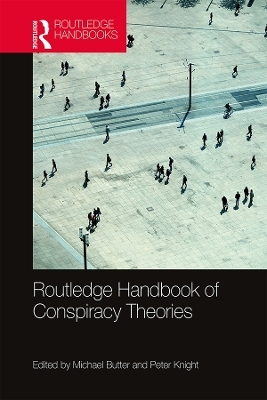
Routledge Handbook of Conspiracy Theories
Routledge (Verlag)
978-1-138-32122-9 (ISBN)
- Titel wird leider nicht erscheinen
- Artikel merken
This handbook provides the most complete analysis of the phenomenon to date. It analyses conspiracy theories from a variety of perspectives, using both qualitative and quantitative methods. It maps out the key debates, and includes chapters on the historical origins of conspiracy theories, as well as their political significance in a broad range of countries and regions. Other chapters consider the psychology and the sociology of conspiracy beliefs, in addition to their changing cultural forms, functions and modes of transmission. This handbook examines where conspiracy theories come from, who believes in them, and what their consequences are.
This book presents an important resource for students and scholars from a range of disciplines interested in the societal and political impact of conspiracy theories, including Area Studies, Anthropology, History, Media and Cultural Studies, Political Science, Psychology and Sociology.
Michael Butter is professor of American Studies at the University of Tübingen, Germany. He is the author of Plots Designs, and Schemes: American Conspiracy Theories from the Puritans to the Present (2014) and The Nature of Conspiracy Theories (2020). Peter Knight is professor of American Studies at the University of Manchester, UK. He is the author of Conspiracy Culture (2000), The Kennedy Assassination (2007) and Reading the Market (2016) and editor of Conspiracy Nation (2002) and Conspiracy Theories in American History: An Encyclopedia (2004). Together they directed the COST Action COMPACT [Comparative Analysis of Conspiracy Theories].
Part I: Definitions and approaches Introduction 1. Conceptual history and conspiracy theory 2. Conspiracy theory in historical, cultural and literary studies 3. Semiotic Approaches to Conspiracy Theories 4. Philosophy and conspiracy theories 5. Psychoanalysis, critical theory and conspiracy theory 6. Conspiracy theory as occult cosmology in anthropology 7. Sociology, social theory and conspiracy theory 8. Conspiracy theories in political science and political theory 9. Social psychology of conspiracy theory 10. Social network analysis, social big data and conspiracy theories Part II: Psychological factors Introduction 1. Personality traits, cognitive styles and worldviews associated with beliefs in conspiracy theories 2. Social-cognitive processes underlying belief in conspiracy theories 3. Motivations, emotions and belief in conspiracy theories 4. Conspiracy theories as psycho-political reactions to perceived power 5. How conspiracy theories spread 6. Conspiracy theories and intergroup relations 7. Consequences of conspiracy theories 8. Countering conspiracy theories and misinformation Part III: Society and politics Introduction 1. Who are the conspiracy theorists? Demographics and conspiracy theories 2. Conspiracy theory entrepreneurs, movements and individuals 3. Conspiracy theories and gender and sexuality 4. Conspiracy theories, political ideology and political behaviour 5. Functions and uses of conspiracy theories in authoritarian regimes 6. Conspiracy theory and populism 7. Radicalisation and conspiracy theories 8. Antisemitism and conspiracism 9. Conspiracy theory and religion Part IV: Media and transmission Introduction 1. Rumours, urban legends and the verbal transmission of conspiracy theories 2. Conspiracy theorising and the history of media in the eighteenth century 3. Genres of conspiracy in nineteenth-century British writing 4. Conspiracy in American narrative 5. Conspiracy theories and visual culture 6. Conspiracy theories in film and television shows 7. Decoding mass media / encoding conspiracy theory 8. The Internet and the spread of conspiracy content 9. Networked disinformation and the lifecycle of online conspiracy theories 10. Conspiracy theories and fake news Part V: Histories and regions Introduction 1. Conspiracy theories in the Roman empire 2. Conspiracy theories in the Middle Ages and the early modern period 3. Freemasons, Illuminati and Jews: Conspiracy theories and the French Revolution 4. Conspiracy Theories in Europe during the twentieth century 5. Conspiracy theories in Putin’s Russia: the case of the ‘New World Order’ 6. Conspiracy theories in and about the Balkans 7. Conspiracy theories in Turkey 8. Conspiracy theories in the Middle East 9. Conspiracy theories in Southeast Asia 10. Conspiracy theories in American history 11. Populism and conspiracy theory in Latin America: a case study of Venezuela
| Erscheint lt. Verlag | 5.4.2020 |
|---|---|
| Reihe/Serie | Conspiracy Theories |
| Zusatzinfo | 2 Tables, black and white; 12 Line drawings, black and white; 5 Halftones, black and white; 17 Illustrations, black and white |
| Verlagsort | London |
| Sprache | englisch |
| Maße | 174 x 246 mm |
| Themenwelt | Geschichte ► Allgemeine Geschichte ► Neuzeit (bis 1918) |
| Geschichte ► Allgemeine Geschichte ► Zeitgeschichte | |
| Geisteswissenschaften ► Geschichte ► Regional- / Ländergeschichte | |
| Geisteswissenschaften ► Philosophie | |
| Sozialwissenschaften ► Politik / Verwaltung ► Europäische / Internationale Politik | |
| ISBN-10 | 1-138-32122-2 / 1138321222 |
| ISBN-13 | 978-1-138-32122-9 / 9781138321229 |
| Zustand | Neuware |
| Haben Sie eine Frage zum Produkt? |
aus dem Bereich


